Cross-Cultural Management Report: A Theoretical and Practical Analysis
VerifiedAdded on 2022/10/06
|13
|4152
|345
Report
AI Summary
This report delves into the multifaceted realm of cross-cultural management, examining its significance in today's globalized business environment. The report is structured around two key topics, each offering a summary, theoretical reflection, and practical insights, culminating in a conclusion. The first topic focuses on the definition of culture, the impact of cultural differences, and the importance of cross-cultural management skills. It explores various cultural dimensions, the influence of culture on individual behavior, and the need for cultural awareness in international business. The second topic highlights the crucial cultural skills and abilities necessary for effective cross-cultural interactions, including cultural intelligence, empathy, flexibility, and communication skills. The report analyzes the role of cultural intelligence and cultural competency in managing cultural differences, and provides an in-depth analysis of how cultural values impact individual thinking and behavior. The report concludes by emphasizing the personal nature of culture, the importance of cultural awareness, and the need for effective managerial approaches in fostering a positive cross-cultural working environment.
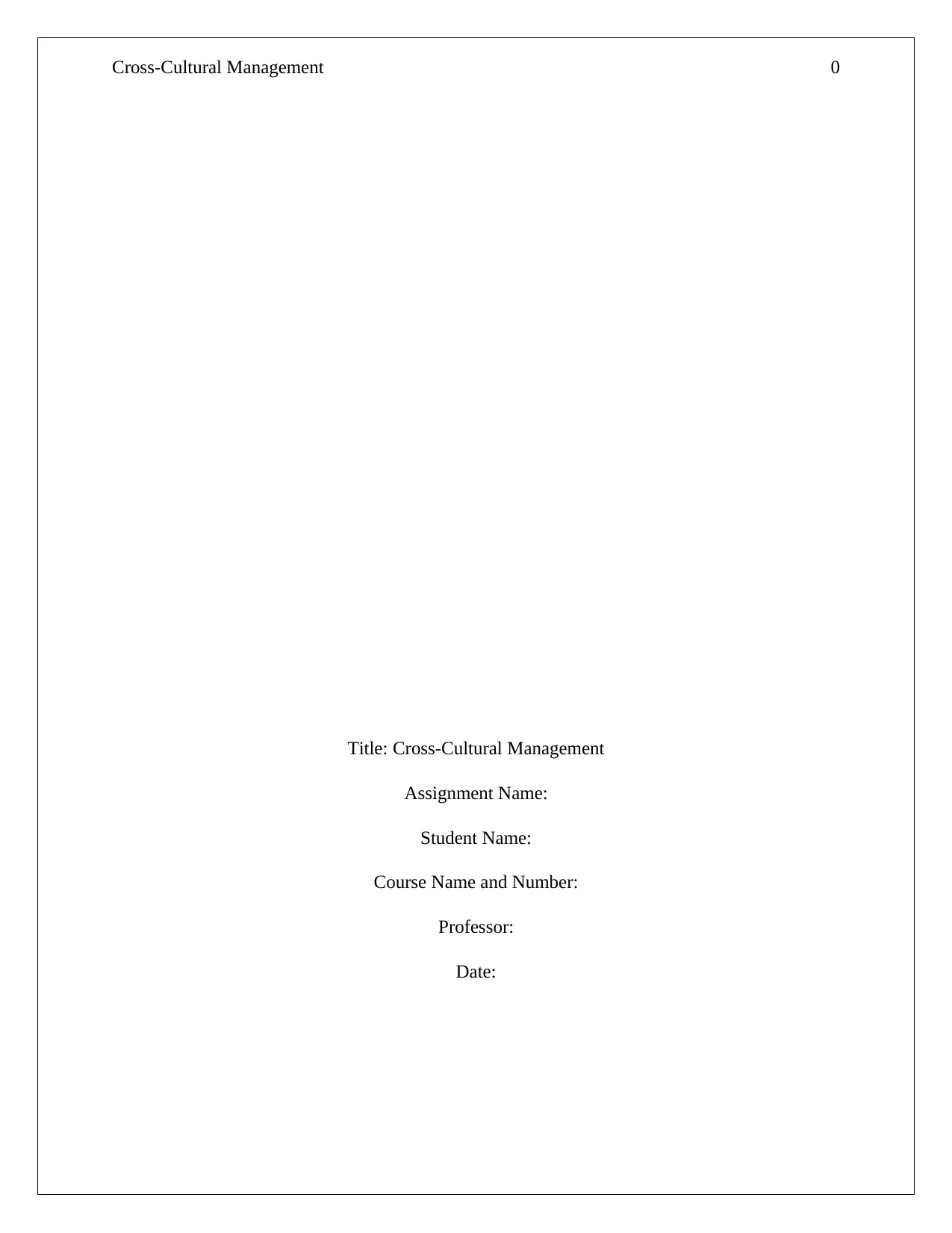
Cross-Cultural Management 0
Title: Cross-Cultural Management
Assignment Name:
Student Name:
Course Name and Number:
Professor:
Date:
Title: Cross-Cultural Management
Assignment Name:
Student Name:
Course Name and Number:
Professor:
Date:
Paraphrase This Document
Need a fresh take? Get an instant paraphrase of this document with our AI Paraphraser
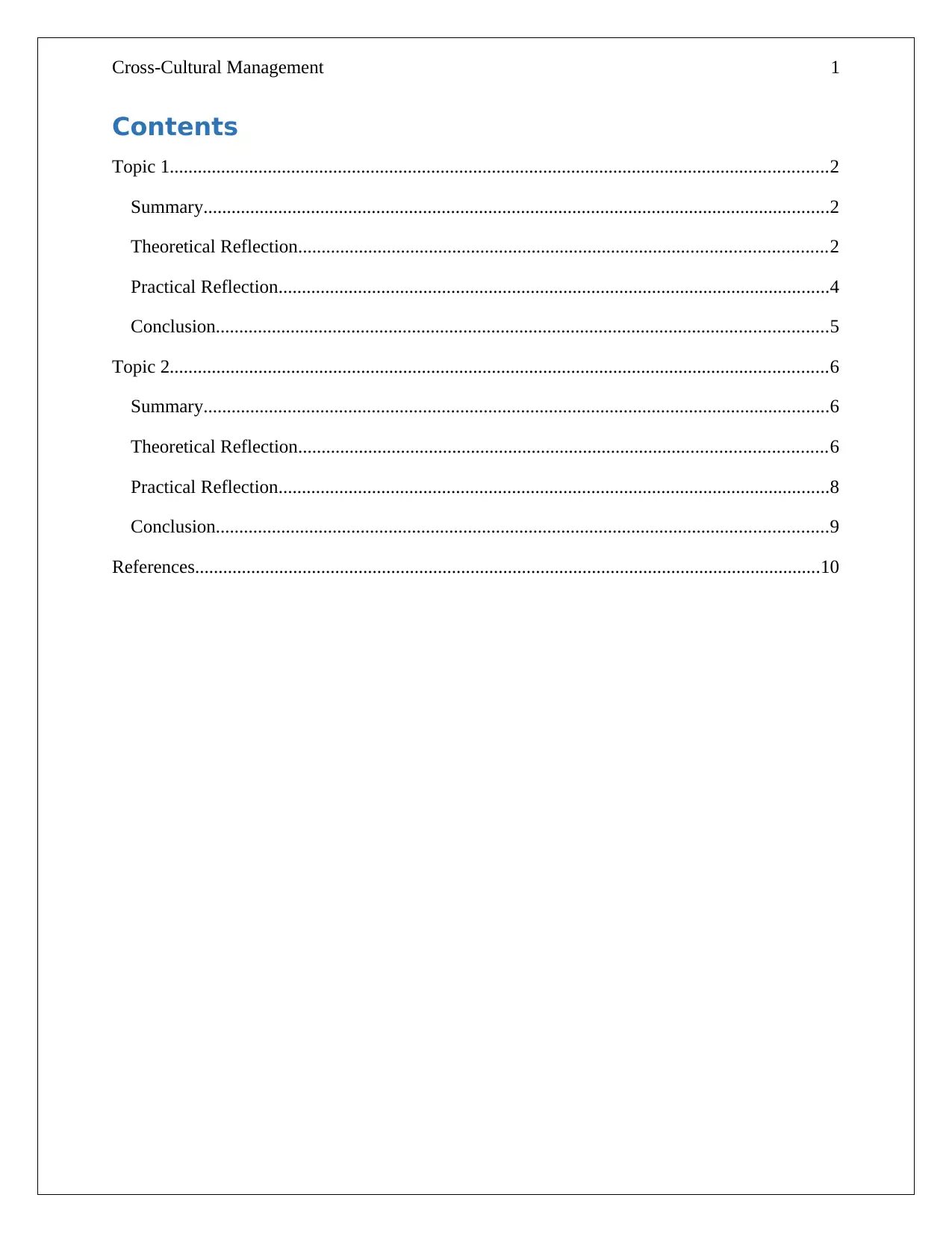
Cross-Cultural Management 1
Contents
Topic 1.............................................................................................................................................2
Summary......................................................................................................................................2
Theoretical Reflection.................................................................................................................2
Practical Reflection......................................................................................................................4
Conclusion...................................................................................................................................5
Topic 2.............................................................................................................................................6
Summary......................................................................................................................................6
Theoretical Reflection.................................................................................................................6
Practical Reflection......................................................................................................................8
Conclusion...................................................................................................................................9
References......................................................................................................................................10
Contents
Topic 1.............................................................................................................................................2
Summary......................................................................................................................................2
Theoretical Reflection.................................................................................................................2
Practical Reflection......................................................................................................................4
Conclusion...................................................................................................................................5
Topic 2.............................................................................................................................................6
Summary......................................................................................................................................6
Theoretical Reflection.................................................................................................................6
Practical Reflection......................................................................................................................8
Conclusion...................................................................................................................................9
References......................................................................................................................................10
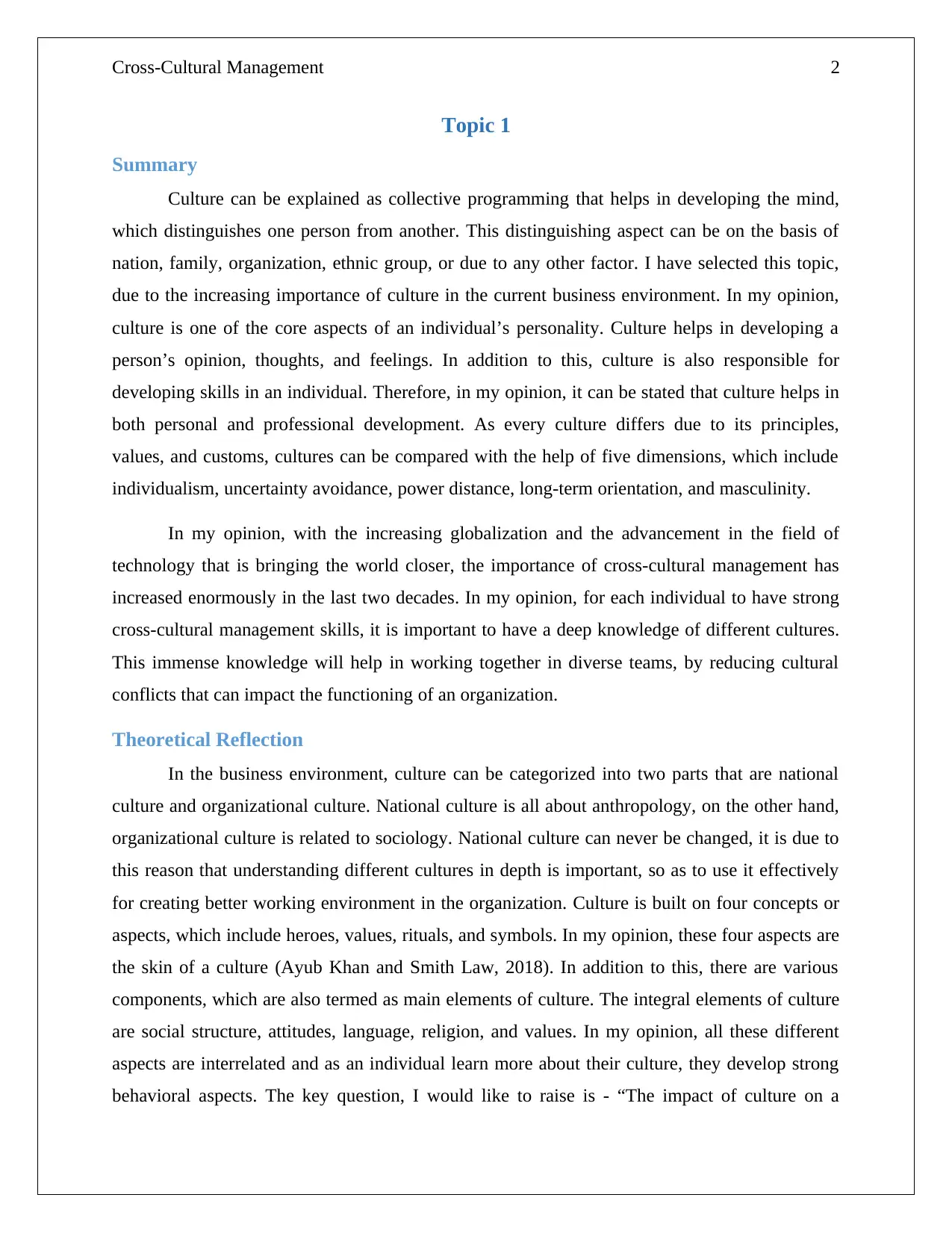
Cross-Cultural Management 2
Topic 1
Summary
Culture can be explained as collective programming that helps in developing the mind,
which distinguishes one person from another. This distinguishing aspect can be on the basis of
nation, family, organization, ethnic group, or due to any other factor. I have selected this topic,
due to the increasing importance of culture in the current business environment. In my opinion,
culture is one of the core aspects of an individual’s personality. Culture helps in developing a
person’s opinion, thoughts, and feelings. In addition to this, culture is also responsible for
developing skills in an individual. Therefore, in my opinion, it can be stated that culture helps in
both personal and professional development. As every culture differs due to its principles,
values, and customs, cultures can be compared with the help of five dimensions, which include
individualism, uncertainty avoidance, power distance, long-term orientation, and masculinity.
In my opinion, with the increasing globalization and the advancement in the field of
technology that is bringing the world closer, the importance of cross-cultural management has
increased enormously in the last two decades. In my opinion, for each individual to have strong
cross-cultural management skills, it is important to have a deep knowledge of different cultures.
This immense knowledge will help in working together in diverse teams, by reducing cultural
conflicts that can impact the functioning of an organization.
Theoretical Reflection
In the business environment, culture can be categorized into two parts that are national
culture and organizational culture. National culture is all about anthropology, on the other hand,
organizational culture is related to sociology. National culture can never be changed, it is due to
this reason that understanding different cultures in depth is important, so as to use it effectively
for creating better working environment in the organization. Culture is built on four concepts or
aspects, which include heroes, values, rituals, and symbols. In my opinion, these four aspects are
the skin of a culture (Ayub Khan and Smith Law, 2018). In addition to this, there are various
components, which are also termed as main elements of culture. The integral elements of culture
are social structure, attitudes, language, religion, and values. In my opinion, all these different
aspects are interrelated and as an individual learn more about their culture, they develop strong
behavioral aspects. The key question, I would like to raise is - “The impact of culture on a
Topic 1
Summary
Culture can be explained as collective programming that helps in developing the mind,
which distinguishes one person from another. This distinguishing aspect can be on the basis of
nation, family, organization, ethnic group, or due to any other factor. I have selected this topic,
due to the increasing importance of culture in the current business environment. In my opinion,
culture is one of the core aspects of an individual’s personality. Culture helps in developing a
person’s opinion, thoughts, and feelings. In addition to this, culture is also responsible for
developing skills in an individual. Therefore, in my opinion, it can be stated that culture helps in
both personal and professional development. As every culture differs due to its principles,
values, and customs, cultures can be compared with the help of five dimensions, which include
individualism, uncertainty avoidance, power distance, long-term orientation, and masculinity.
In my opinion, with the increasing globalization and the advancement in the field of
technology that is bringing the world closer, the importance of cross-cultural management has
increased enormously in the last two decades. In my opinion, for each individual to have strong
cross-cultural management skills, it is important to have a deep knowledge of different cultures.
This immense knowledge will help in working together in diverse teams, by reducing cultural
conflicts that can impact the functioning of an organization.
Theoretical Reflection
In the business environment, culture can be categorized into two parts that are national
culture and organizational culture. National culture is all about anthropology, on the other hand,
organizational culture is related to sociology. National culture can never be changed, it is due to
this reason that understanding different cultures in depth is important, so as to use it effectively
for creating better working environment in the organization. Culture is built on four concepts or
aspects, which include heroes, values, rituals, and symbols. In my opinion, these four aspects are
the skin of a culture (Ayub Khan and Smith Law, 2018). In addition to this, there are various
components, which are also termed as main elements of culture. The integral elements of culture
are social structure, attitudes, language, religion, and values. In my opinion, all these different
aspects are interrelated and as an individual learn more about their culture, they develop strong
behavioral aspects. The key question, I would like to raise is - “The impact of culture on a
⊘ This is a preview!⊘
Do you want full access?
Subscribe today to unlock all pages.

Trusted by 1+ million students worldwide
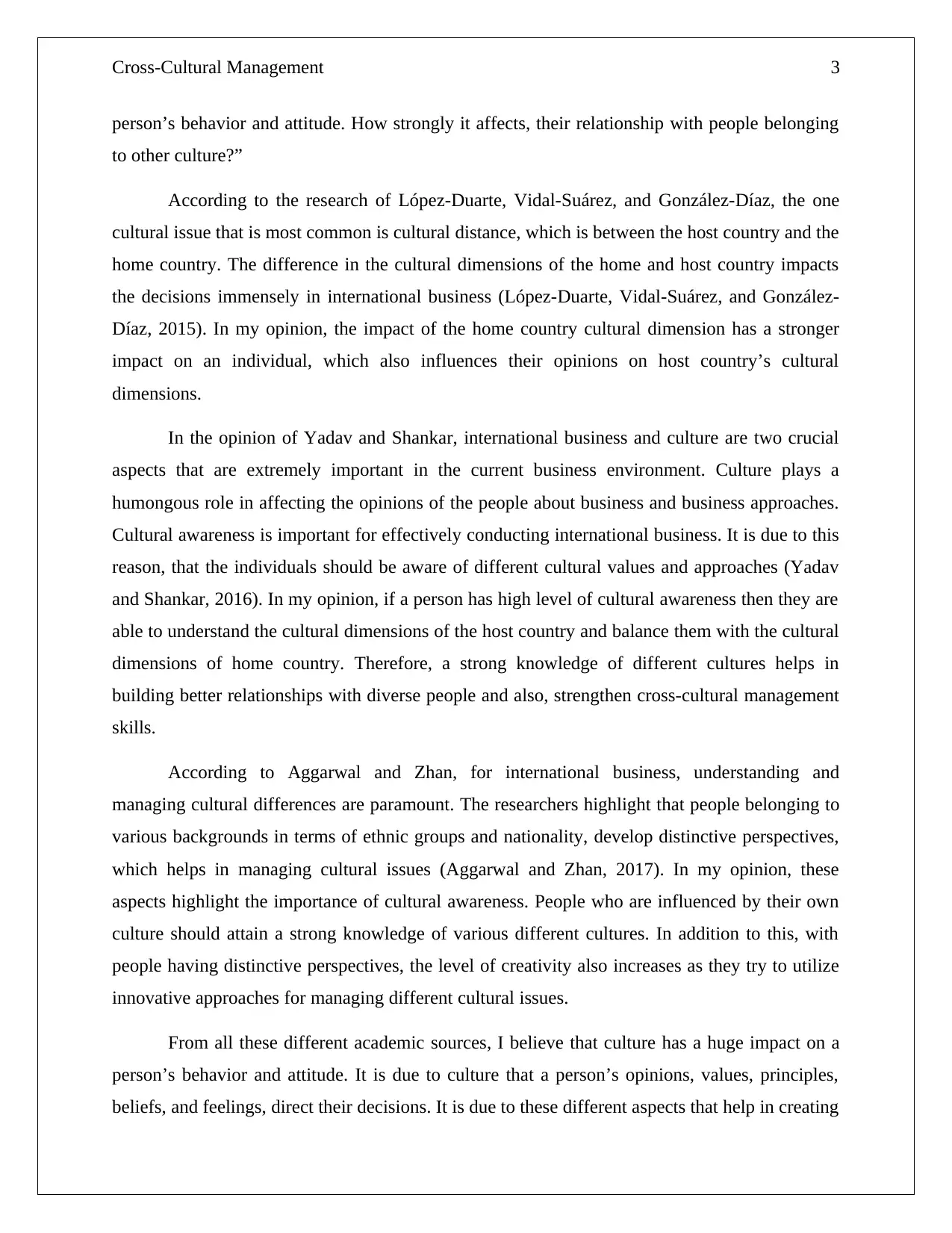
Cross-Cultural Management 3
person’s behavior and attitude. How strongly it affects, their relationship with people belonging
to other culture?”
According to the research of López-Duarte, Vidal-Suárez, and González-Díaz, the one
cultural issue that is most common is cultural distance, which is between the host country and the
home country. The difference in the cultural dimensions of the home and host country impacts
the decisions immensely in international business (López-Duarte, Vidal-Suárez, and González-
Díaz, 2015). In my opinion, the impact of the home country cultural dimension has a stronger
impact on an individual, which also influences their opinions on host country’s cultural
dimensions.
In the opinion of Yadav and Shankar, international business and culture are two crucial
aspects that are extremely important in the current business environment. Culture plays a
humongous role in affecting the opinions of the people about business and business approaches.
Cultural awareness is important for effectively conducting international business. It is due to this
reason, that the individuals should be aware of different cultural values and approaches (Yadav
and Shankar, 2016). In my opinion, if a person has high level of cultural awareness then they are
able to understand the cultural dimensions of the host country and balance them with the cultural
dimensions of home country. Therefore, a strong knowledge of different cultures helps in
building better relationships with diverse people and also, strengthen cross-cultural management
skills.
According to Aggarwal and Zhan, for international business, understanding and
managing cultural differences are paramount. The researchers highlight that people belonging to
various backgrounds in terms of ethnic groups and nationality, develop distinctive perspectives,
which helps in managing cultural issues (Aggarwal and Zhan, 2017). In my opinion, these
aspects highlight the importance of cultural awareness. People who are influenced by their own
culture should attain a strong knowledge of various different cultures. In addition to this, with
people having distinctive perspectives, the level of creativity also increases as they try to utilize
innovative approaches for managing different cultural issues.
From all these different academic sources, I believe that culture has a huge impact on a
person’s behavior and attitude. It is due to culture that a person’s opinions, values, principles,
beliefs, and feelings, direct their decisions. It is due to these different aspects that help in creating
person’s behavior and attitude. How strongly it affects, their relationship with people belonging
to other culture?”
According to the research of López-Duarte, Vidal-Suárez, and González-Díaz, the one
cultural issue that is most common is cultural distance, which is between the host country and the
home country. The difference in the cultural dimensions of the home and host country impacts
the decisions immensely in international business (López-Duarte, Vidal-Suárez, and González-
Díaz, 2015). In my opinion, the impact of the home country cultural dimension has a stronger
impact on an individual, which also influences their opinions on host country’s cultural
dimensions.
In the opinion of Yadav and Shankar, international business and culture are two crucial
aspects that are extremely important in the current business environment. Culture plays a
humongous role in affecting the opinions of the people about business and business approaches.
Cultural awareness is important for effectively conducting international business. It is due to this
reason, that the individuals should be aware of different cultural values and approaches (Yadav
and Shankar, 2016). In my opinion, if a person has high level of cultural awareness then they are
able to understand the cultural dimensions of the host country and balance them with the cultural
dimensions of home country. Therefore, a strong knowledge of different cultures helps in
building better relationships with diverse people and also, strengthen cross-cultural management
skills.
According to Aggarwal and Zhan, for international business, understanding and
managing cultural differences are paramount. The researchers highlight that people belonging to
various backgrounds in terms of ethnic groups and nationality, develop distinctive perspectives,
which helps in managing cultural issues (Aggarwal and Zhan, 2017). In my opinion, these
aspects highlight the importance of cultural awareness. People who are influenced by their own
culture should attain a strong knowledge of various different cultures. In addition to this, with
people having distinctive perspectives, the level of creativity also increases as they try to utilize
innovative approaches for managing different cultural issues.
From all these different academic sources, I believe that culture has a huge impact on a
person’s behavior and attitude. It is due to culture that a person’s opinions, values, principles,
beliefs, and feelings, direct their decisions. It is due to these different aspects that help in creating
Paraphrase This Document
Need a fresh take? Get an instant paraphrase of this document with our AI Paraphraser
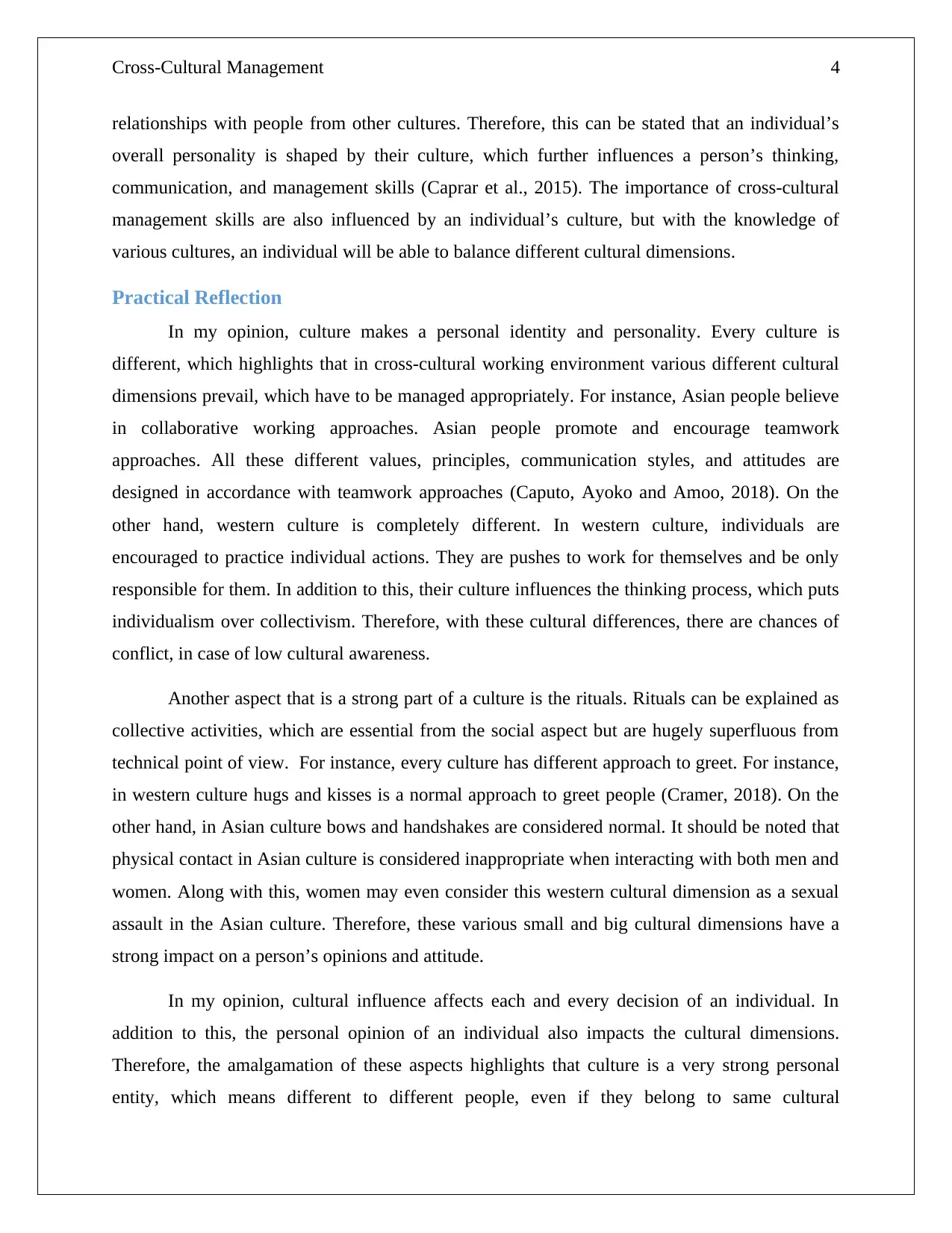
Cross-Cultural Management 4
relationships with people from other cultures. Therefore, this can be stated that an individual’s
overall personality is shaped by their culture, which further influences a person’s thinking,
communication, and management skills (Caprar et al., 2015). The importance of cross-cultural
management skills are also influenced by an individual’s culture, but with the knowledge of
various cultures, an individual will be able to balance different cultural dimensions.
Practical Reflection
In my opinion, culture makes a personal identity and personality. Every culture is
different, which highlights that in cross-cultural working environment various different cultural
dimensions prevail, which have to be managed appropriately. For instance, Asian people believe
in collaborative working approaches. Asian people promote and encourage teamwork
approaches. All these different values, principles, communication styles, and attitudes are
designed in accordance with teamwork approaches (Caputo, Ayoko and Amoo, 2018). On the
other hand, western culture is completely different. In western culture, individuals are
encouraged to practice individual actions. They are pushes to work for themselves and be only
responsible for them. In addition to this, their culture influences the thinking process, which puts
individualism over collectivism. Therefore, with these cultural differences, there are chances of
conflict, in case of low cultural awareness.
Another aspect that is a strong part of a culture is the rituals. Rituals can be explained as
collective activities, which are essential from the social aspect but are hugely superfluous from
technical point of view. For instance, every culture has different approach to greet. For instance,
in western culture hugs and kisses is a normal approach to greet people (Cramer, 2018). On the
other hand, in Asian culture bows and handshakes are considered normal. It should be noted that
physical contact in Asian culture is considered inappropriate when interacting with both men and
women. Along with this, women may even consider this western cultural dimension as a sexual
assault in the Asian culture. Therefore, these various small and big cultural dimensions have a
strong impact on a person’s opinions and attitude.
In my opinion, cultural influence affects each and every decision of an individual. In
addition to this, the personal opinion of an individual also impacts the cultural dimensions.
Therefore, the amalgamation of these aspects highlights that culture is a very strong personal
entity, which means different to different people, even if they belong to same cultural
relationships with people from other cultures. Therefore, this can be stated that an individual’s
overall personality is shaped by their culture, which further influences a person’s thinking,
communication, and management skills (Caprar et al., 2015). The importance of cross-cultural
management skills are also influenced by an individual’s culture, but with the knowledge of
various cultures, an individual will be able to balance different cultural dimensions.
Practical Reflection
In my opinion, culture makes a personal identity and personality. Every culture is
different, which highlights that in cross-cultural working environment various different cultural
dimensions prevail, which have to be managed appropriately. For instance, Asian people believe
in collaborative working approaches. Asian people promote and encourage teamwork
approaches. All these different values, principles, communication styles, and attitudes are
designed in accordance with teamwork approaches (Caputo, Ayoko and Amoo, 2018). On the
other hand, western culture is completely different. In western culture, individuals are
encouraged to practice individual actions. They are pushes to work for themselves and be only
responsible for them. In addition to this, their culture influences the thinking process, which puts
individualism over collectivism. Therefore, with these cultural differences, there are chances of
conflict, in case of low cultural awareness.
Another aspect that is a strong part of a culture is the rituals. Rituals can be explained as
collective activities, which are essential from the social aspect but are hugely superfluous from
technical point of view. For instance, every culture has different approach to greet. For instance,
in western culture hugs and kisses is a normal approach to greet people (Cramer, 2018). On the
other hand, in Asian culture bows and handshakes are considered normal. It should be noted that
physical contact in Asian culture is considered inappropriate when interacting with both men and
women. Along with this, women may even consider this western cultural dimension as a sexual
assault in the Asian culture. Therefore, these various small and big cultural dimensions have a
strong impact on a person’s opinions and attitude.
In my opinion, cultural influence affects each and every decision of an individual. In
addition to this, the personal opinion of an individual also impacts the cultural dimensions.
Therefore, the amalgamation of these aspects highlights that culture is a very strong personal
entity, which means different to different people, even if they belong to same cultural
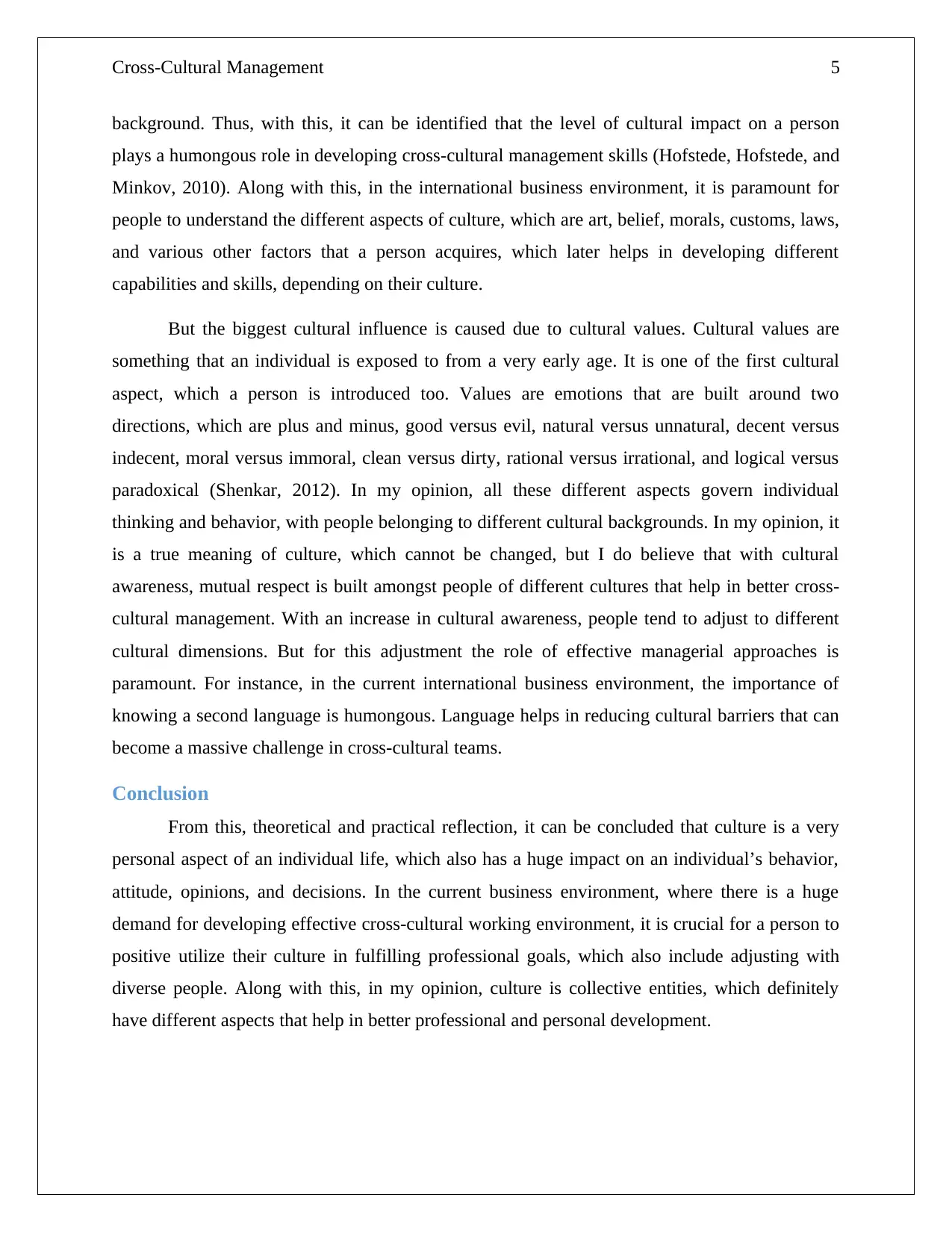
Cross-Cultural Management 5
background. Thus, with this, it can be identified that the level of cultural impact on a person
plays a humongous role in developing cross-cultural management skills (Hofstede, Hofstede, and
Minkov, 2010). Along with this, in the international business environment, it is paramount for
people to understand the different aspects of culture, which are art, belief, morals, customs, laws,
and various other factors that a person acquires, which later helps in developing different
capabilities and skills, depending on their culture.
But the biggest cultural influence is caused due to cultural values. Cultural values are
something that an individual is exposed to from a very early age. It is one of the first cultural
aspect, which a person is introduced too. Values are emotions that are built around two
directions, which are plus and minus, good versus evil, natural versus unnatural, decent versus
indecent, moral versus immoral, clean versus dirty, rational versus irrational, and logical versus
paradoxical (Shenkar, 2012). In my opinion, all these different aspects govern individual
thinking and behavior, with people belonging to different cultural backgrounds. In my opinion, it
is a true meaning of culture, which cannot be changed, but I do believe that with cultural
awareness, mutual respect is built amongst people of different cultures that help in better cross-
cultural management. With an increase in cultural awareness, people tend to adjust to different
cultural dimensions. But for this adjustment the role of effective managerial approaches is
paramount. For instance, in the current international business environment, the importance of
knowing a second language is humongous. Language helps in reducing cultural barriers that can
become a massive challenge in cross-cultural teams.
Conclusion
From this, theoretical and practical reflection, it can be concluded that culture is a very
personal aspect of an individual life, which also has a huge impact on an individual’s behavior,
attitude, opinions, and decisions. In the current business environment, where there is a huge
demand for developing effective cross-cultural working environment, it is crucial for a person to
positive utilize their culture in fulfilling professional goals, which also include adjusting with
diverse people. Along with this, in my opinion, culture is collective entities, which definitely
have different aspects that help in better professional and personal development.
background. Thus, with this, it can be identified that the level of cultural impact on a person
plays a humongous role in developing cross-cultural management skills (Hofstede, Hofstede, and
Minkov, 2010). Along with this, in the international business environment, it is paramount for
people to understand the different aspects of culture, which are art, belief, morals, customs, laws,
and various other factors that a person acquires, which later helps in developing different
capabilities and skills, depending on their culture.
But the biggest cultural influence is caused due to cultural values. Cultural values are
something that an individual is exposed to from a very early age. It is one of the first cultural
aspect, which a person is introduced too. Values are emotions that are built around two
directions, which are plus and minus, good versus evil, natural versus unnatural, decent versus
indecent, moral versus immoral, clean versus dirty, rational versus irrational, and logical versus
paradoxical (Shenkar, 2012). In my opinion, all these different aspects govern individual
thinking and behavior, with people belonging to different cultural backgrounds. In my opinion, it
is a true meaning of culture, which cannot be changed, but I do believe that with cultural
awareness, mutual respect is built amongst people of different cultures that help in better cross-
cultural management. With an increase in cultural awareness, people tend to adjust to different
cultural dimensions. But for this adjustment the role of effective managerial approaches is
paramount. For instance, in the current international business environment, the importance of
knowing a second language is humongous. Language helps in reducing cultural barriers that can
become a massive challenge in cross-cultural teams.
Conclusion
From this, theoretical and practical reflection, it can be concluded that culture is a very
personal aspect of an individual life, which also has a huge impact on an individual’s behavior,
attitude, opinions, and decisions. In the current business environment, where there is a huge
demand for developing effective cross-cultural working environment, it is crucial for a person to
positive utilize their culture in fulfilling professional goals, which also include adjusting with
diverse people. Along with this, in my opinion, culture is collective entities, which definitely
have different aspects that help in better professional and personal development.
⊘ This is a preview!⊘
Do you want full access?
Subscribe today to unlock all pages.

Trusted by 1+ million students worldwide
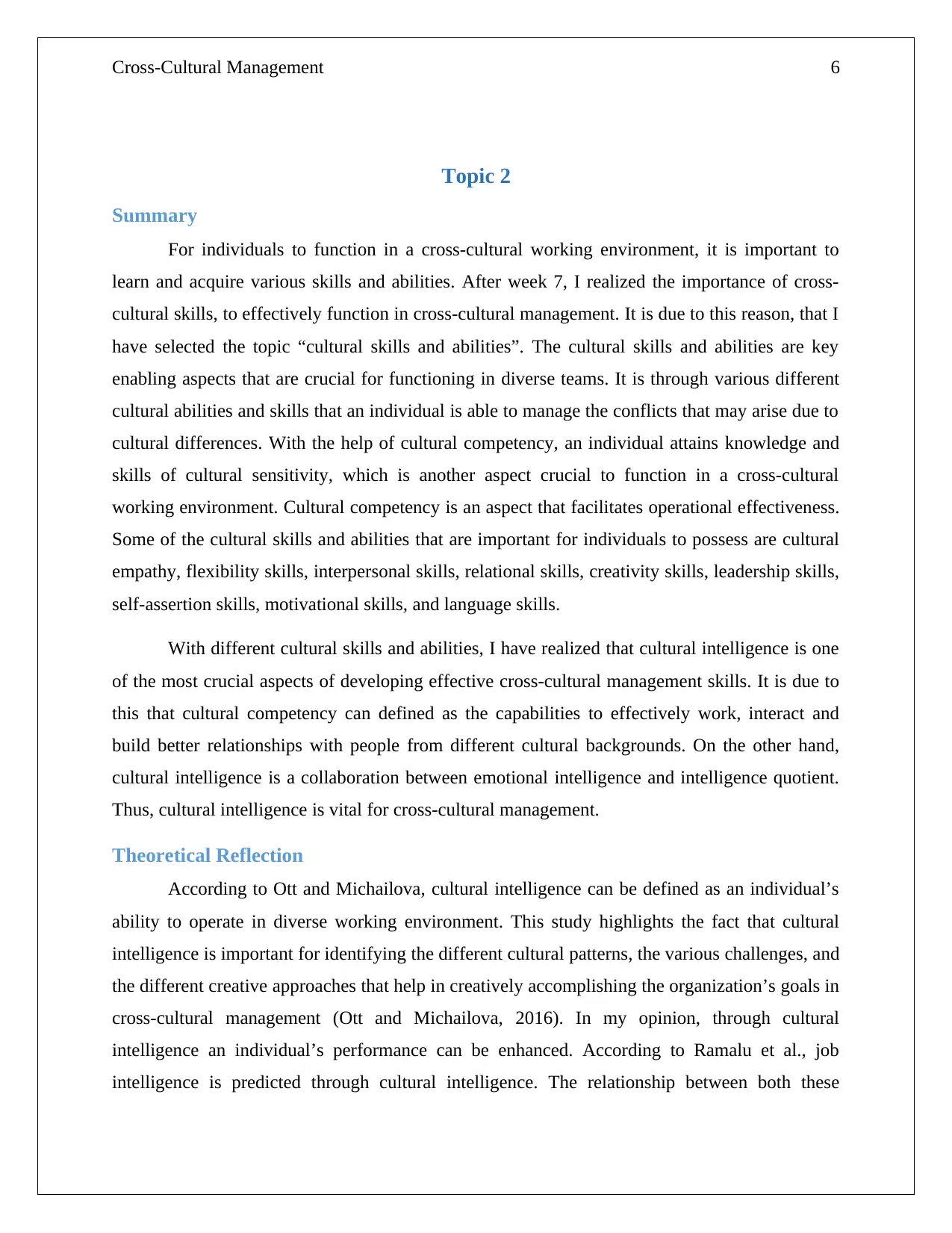
Cross-Cultural Management 6
Topic 2
Summary
For individuals to function in a cross-cultural working environment, it is important to
learn and acquire various skills and abilities. After week 7, I realized the importance of cross-
cultural skills, to effectively function in cross-cultural management. It is due to this reason, that I
have selected the topic “cultural skills and abilities”. The cultural skills and abilities are key
enabling aspects that are crucial for functioning in diverse teams. It is through various different
cultural abilities and skills that an individual is able to manage the conflicts that may arise due to
cultural differences. With the help of cultural competency, an individual attains knowledge and
skills of cultural sensitivity, which is another aspect crucial to function in a cross-cultural
working environment. Cultural competency is an aspect that facilitates operational effectiveness.
Some of the cultural skills and abilities that are important for individuals to possess are cultural
empathy, flexibility skills, interpersonal skills, relational skills, creativity skills, leadership skills,
self-assertion skills, motivational skills, and language skills.
With different cultural skills and abilities, I have realized that cultural intelligence is one
of the most crucial aspects of developing effective cross-cultural management skills. It is due to
this that cultural competency can defined as the capabilities to effectively work, interact and
build better relationships with people from different cultural backgrounds. On the other hand,
cultural intelligence is a collaboration between emotional intelligence and intelligence quotient.
Thus, cultural intelligence is vital for cross-cultural management.
Theoretical Reflection
According to Ott and Michailova, cultural intelligence can be defined as an individual’s
ability to operate in diverse working environment. This study highlights the fact that cultural
intelligence is important for identifying the different cultural patterns, the various challenges, and
the different creative approaches that help in creatively accomplishing the organization’s goals in
cross-cultural management (Ott and Michailova, 2016). In my opinion, through cultural
intelligence an individual’s performance can be enhanced. According to Ramalu et al., job
intelligence is predicted through cultural intelligence. The relationship between both these
Topic 2
Summary
For individuals to function in a cross-cultural working environment, it is important to
learn and acquire various skills and abilities. After week 7, I realized the importance of cross-
cultural skills, to effectively function in cross-cultural management. It is due to this reason, that I
have selected the topic “cultural skills and abilities”. The cultural skills and abilities are key
enabling aspects that are crucial for functioning in diverse teams. It is through various different
cultural abilities and skills that an individual is able to manage the conflicts that may arise due to
cultural differences. With the help of cultural competency, an individual attains knowledge and
skills of cultural sensitivity, which is another aspect crucial to function in a cross-cultural
working environment. Cultural competency is an aspect that facilitates operational effectiveness.
Some of the cultural skills and abilities that are important for individuals to possess are cultural
empathy, flexibility skills, interpersonal skills, relational skills, creativity skills, leadership skills,
self-assertion skills, motivational skills, and language skills.
With different cultural skills and abilities, I have realized that cultural intelligence is one
of the most crucial aspects of developing effective cross-cultural management skills. It is due to
this that cultural competency can defined as the capabilities to effectively work, interact and
build better relationships with people from different cultural backgrounds. On the other hand,
cultural intelligence is a collaboration between emotional intelligence and intelligence quotient.
Thus, cultural intelligence is vital for cross-cultural management.
Theoretical Reflection
According to Ott and Michailova, cultural intelligence can be defined as an individual’s
ability to operate in diverse working environment. This study highlights the fact that cultural
intelligence is important for identifying the different cultural patterns, the various challenges, and
the different creative approaches that help in creatively accomplishing the organization’s goals in
cross-cultural management (Ott and Michailova, 2016). In my opinion, through cultural
intelligence an individual’s performance can be enhanced. According to Ramalu et al., job
intelligence is predicted through cultural intelligence. The relationship between both these
Paraphrase This Document
Need a fresh take? Get an instant paraphrase of this document with our AI Paraphraser
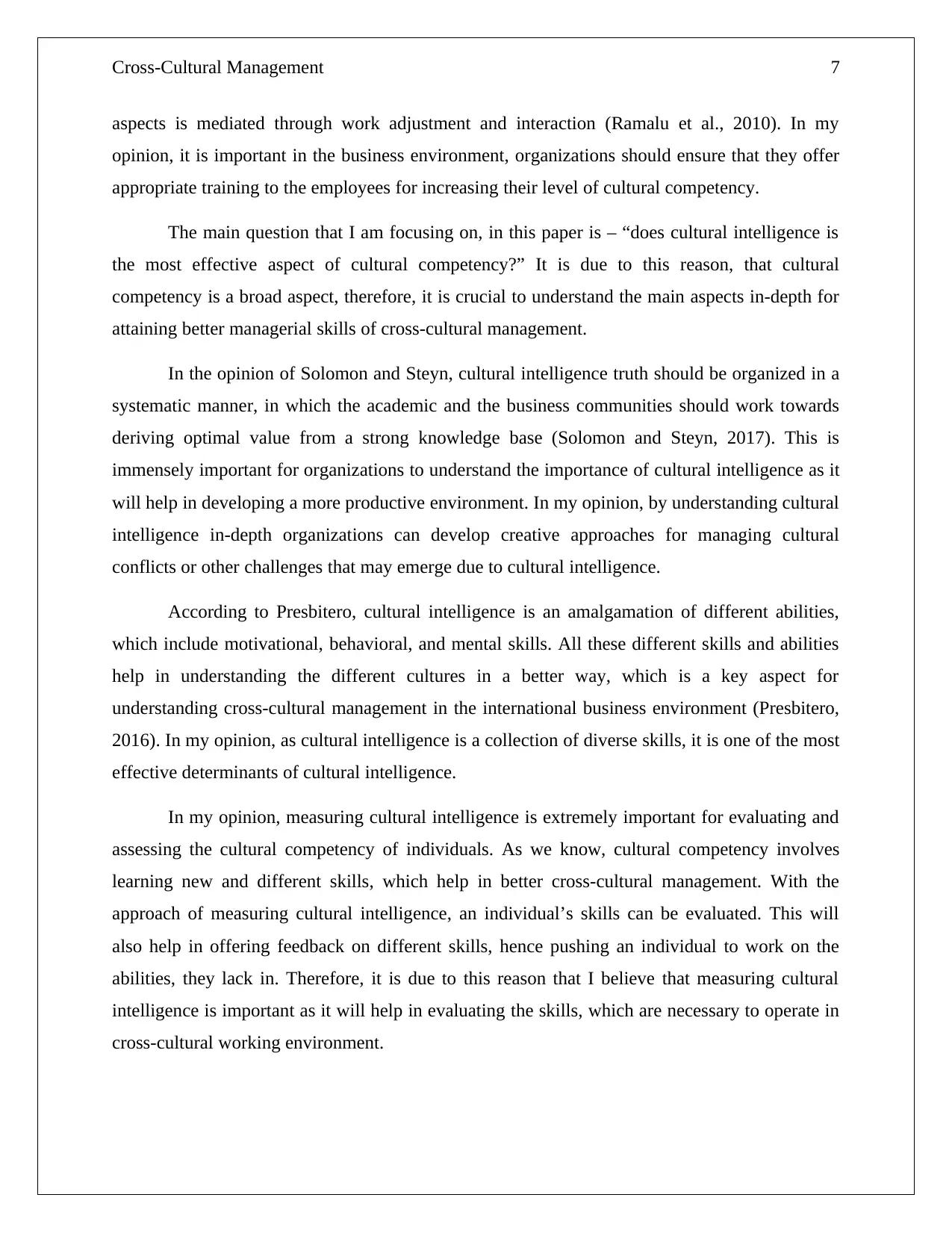
Cross-Cultural Management 7
aspects is mediated through work adjustment and interaction (Ramalu et al., 2010). In my
opinion, it is important in the business environment, organizations should ensure that they offer
appropriate training to the employees for increasing their level of cultural competency.
The main question that I am focusing on, in this paper is – “does cultural intelligence is
the most effective aspect of cultural competency?” It is due to this reason, that cultural
competency is a broad aspect, therefore, it is crucial to understand the main aspects in-depth for
attaining better managerial skills of cross-cultural management.
In the opinion of Solomon and Steyn, cultural intelligence truth should be organized in a
systematic manner, in which the academic and the business communities should work towards
deriving optimal value from a strong knowledge base (Solomon and Steyn, 2017). This is
immensely important for organizations to understand the importance of cultural intelligence as it
will help in developing a more productive environment. In my opinion, by understanding cultural
intelligence in-depth organizations can develop creative approaches for managing cultural
conflicts or other challenges that may emerge due to cultural intelligence.
According to Presbitero, cultural intelligence is an amalgamation of different abilities,
which include motivational, behavioral, and mental skills. All these different skills and abilities
help in understanding the different cultures in a better way, which is a key aspect for
understanding cross-cultural management in the international business environment (Presbitero,
2016). In my opinion, as cultural intelligence is a collection of diverse skills, it is one of the most
effective determinants of cultural intelligence.
In my opinion, measuring cultural intelligence is extremely important for evaluating and
assessing the cultural competency of individuals. As we know, cultural competency involves
learning new and different skills, which help in better cross-cultural management. With the
approach of measuring cultural intelligence, an individual’s skills can be evaluated. This will
also help in offering feedback on different skills, hence pushing an individual to work on the
abilities, they lack in. Therefore, it is due to this reason that I believe that measuring cultural
intelligence is important as it will help in evaluating the skills, which are necessary to operate in
cross-cultural working environment.
aspects is mediated through work adjustment and interaction (Ramalu et al., 2010). In my
opinion, it is important in the business environment, organizations should ensure that they offer
appropriate training to the employees for increasing their level of cultural competency.
The main question that I am focusing on, in this paper is – “does cultural intelligence is
the most effective aspect of cultural competency?” It is due to this reason, that cultural
competency is a broad aspect, therefore, it is crucial to understand the main aspects in-depth for
attaining better managerial skills of cross-cultural management.
In the opinion of Solomon and Steyn, cultural intelligence truth should be organized in a
systematic manner, in which the academic and the business communities should work towards
deriving optimal value from a strong knowledge base (Solomon and Steyn, 2017). This is
immensely important for organizations to understand the importance of cultural intelligence as it
will help in developing a more productive environment. In my opinion, by understanding cultural
intelligence in-depth organizations can develop creative approaches for managing cultural
conflicts or other challenges that may emerge due to cultural intelligence.
According to Presbitero, cultural intelligence is an amalgamation of different abilities,
which include motivational, behavioral, and mental skills. All these different skills and abilities
help in understanding the different cultures in a better way, which is a key aspect for
understanding cross-cultural management in the international business environment (Presbitero,
2016). In my opinion, as cultural intelligence is a collection of diverse skills, it is one of the most
effective determinants of cultural intelligence.
In my opinion, measuring cultural intelligence is extremely important for evaluating and
assessing the cultural competency of individuals. As we know, cultural competency involves
learning new and different skills, which help in better cross-cultural management. With the
approach of measuring cultural intelligence, an individual’s skills can be evaluated. This will
also help in offering feedback on different skills, hence pushing an individual to work on the
abilities, they lack in. Therefore, it is due to this reason that I believe that measuring cultural
intelligence is important as it will help in evaluating the skills, which are necessary to operate in
cross-cultural working environment.
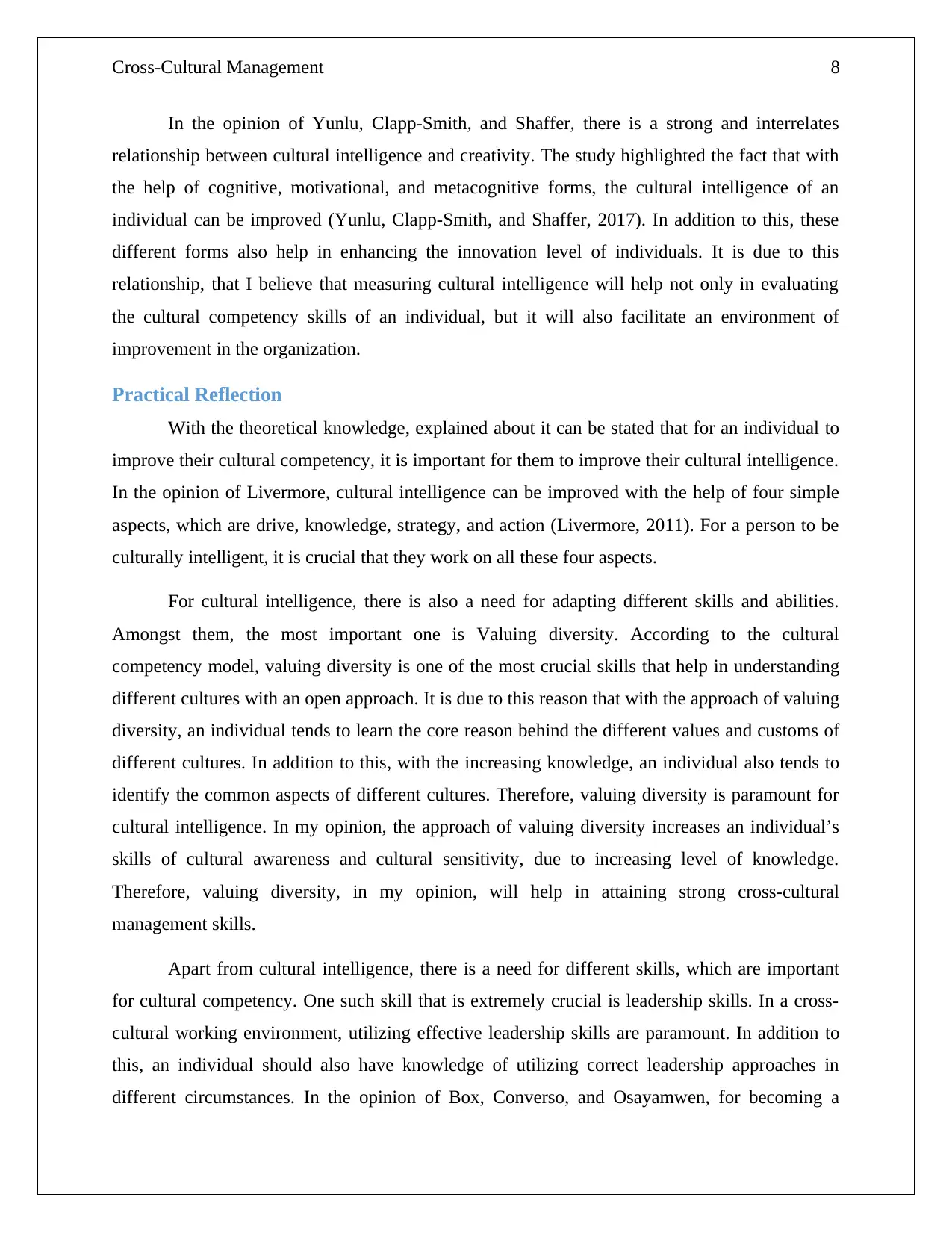
Cross-Cultural Management 8
In the opinion of Yunlu, Clapp-Smith, and Shaffer, there is a strong and interrelates
relationship between cultural intelligence and creativity. The study highlighted the fact that with
the help of cognitive, motivational, and metacognitive forms, the cultural intelligence of an
individual can be improved (Yunlu, Clapp-Smith, and Shaffer, 2017). In addition to this, these
different forms also help in enhancing the innovation level of individuals. It is due to this
relationship, that I believe that measuring cultural intelligence will help not only in evaluating
the cultural competency skills of an individual, but it will also facilitate an environment of
improvement in the organization.
Practical Reflection
With the theoretical knowledge, explained about it can be stated that for an individual to
improve their cultural competency, it is important for them to improve their cultural intelligence.
In the opinion of Livermore, cultural intelligence can be improved with the help of four simple
aspects, which are drive, knowledge, strategy, and action (Livermore, 2011). For a person to be
culturally intelligent, it is crucial that they work on all these four aspects.
For cultural intelligence, there is also a need for adapting different skills and abilities.
Amongst them, the most important one is Valuing diversity. According to the cultural
competency model, valuing diversity is one of the most crucial skills that help in understanding
different cultures with an open approach. It is due to this reason that with the approach of valuing
diversity, an individual tends to learn the core reason behind the different values and customs of
different cultures. In addition to this, with the increasing knowledge, an individual also tends to
identify the common aspects of different cultures. Therefore, valuing diversity is paramount for
cultural intelligence. In my opinion, the approach of valuing diversity increases an individual’s
skills of cultural awareness and cultural sensitivity, due to increasing level of knowledge.
Therefore, valuing diversity, in my opinion, will help in attaining strong cross-cultural
management skills.
Apart from cultural intelligence, there is a need for different skills, which are important
for cultural competency. One such skill that is extremely crucial is leadership skills. In a cross-
cultural working environment, utilizing effective leadership skills are paramount. In addition to
this, an individual should also have knowledge of utilizing correct leadership approaches in
different circumstances. In the opinion of Box, Converso, and Osayamwen, for becoming a
In the opinion of Yunlu, Clapp-Smith, and Shaffer, there is a strong and interrelates
relationship between cultural intelligence and creativity. The study highlighted the fact that with
the help of cognitive, motivational, and metacognitive forms, the cultural intelligence of an
individual can be improved (Yunlu, Clapp-Smith, and Shaffer, 2017). In addition to this, these
different forms also help in enhancing the innovation level of individuals. It is due to this
relationship, that I believe that measuring cultural intelligence will help not only in evaluating
the cultural competency skills of an individual, but it will also facilitate an environment of
improvement in the organization.
Practical Reflection
With the theoretical knowledge, explained about it can be stated that for an individual to
improve their cultural competency, it is important for them to improve their cultural intelligence.
In the opinion of Livermore, cultural intelligence can be improved with the help of four simple
aspects, which are drive, knowledge, strategy, and action (Livermore, 2011). For a person to be
culturally intelligent, it is crucial that they work on all these four aspects.
For cultural intelligence, there is also a need for adapting different skills and abilities.
Amongst them, the most important one is Valuing diversity. According to the cultural
competency model, valuing diversity is one of the most crucial skills that help in understanding
different cultures with an open approach. It is due to this reason that with the approach of valuing
diversity, an individual tends to learn the core reason behind the different values and customs of
different cultures. In addition to this, with the increasing knowledge, an individual also tends to
identify the common aspects of different cultures. Therefore, valuing diversity is paramount for
cultural intelligence. In my opinion, the approach of valuing diversity increases an individual’s
skills of cultural awareness and cultural sensitivity, due to increasing level of knowledge.
Therefore, valuing diversity, in my opinion, will help in attaining strong cross-cultural
management skills.
Apart from cultural intelligence, there is a need for different skills, which are important
for cultural competency. One such skill that is extremely crucial is leadership skills. In a cross-
cultural working environment, utilizing effective leadership skills are paramount. In addition to
this, an individual should also have knowledge of utilizing correct leadership approaches in
different circumstances. In the opinion of Box, Converso, and Osayamwen, for becoming a
⊘ This is a preview!⊘
Do you want full access?
Subscribe today to unlock all pages.

Trusted by 1+ million students worldwide
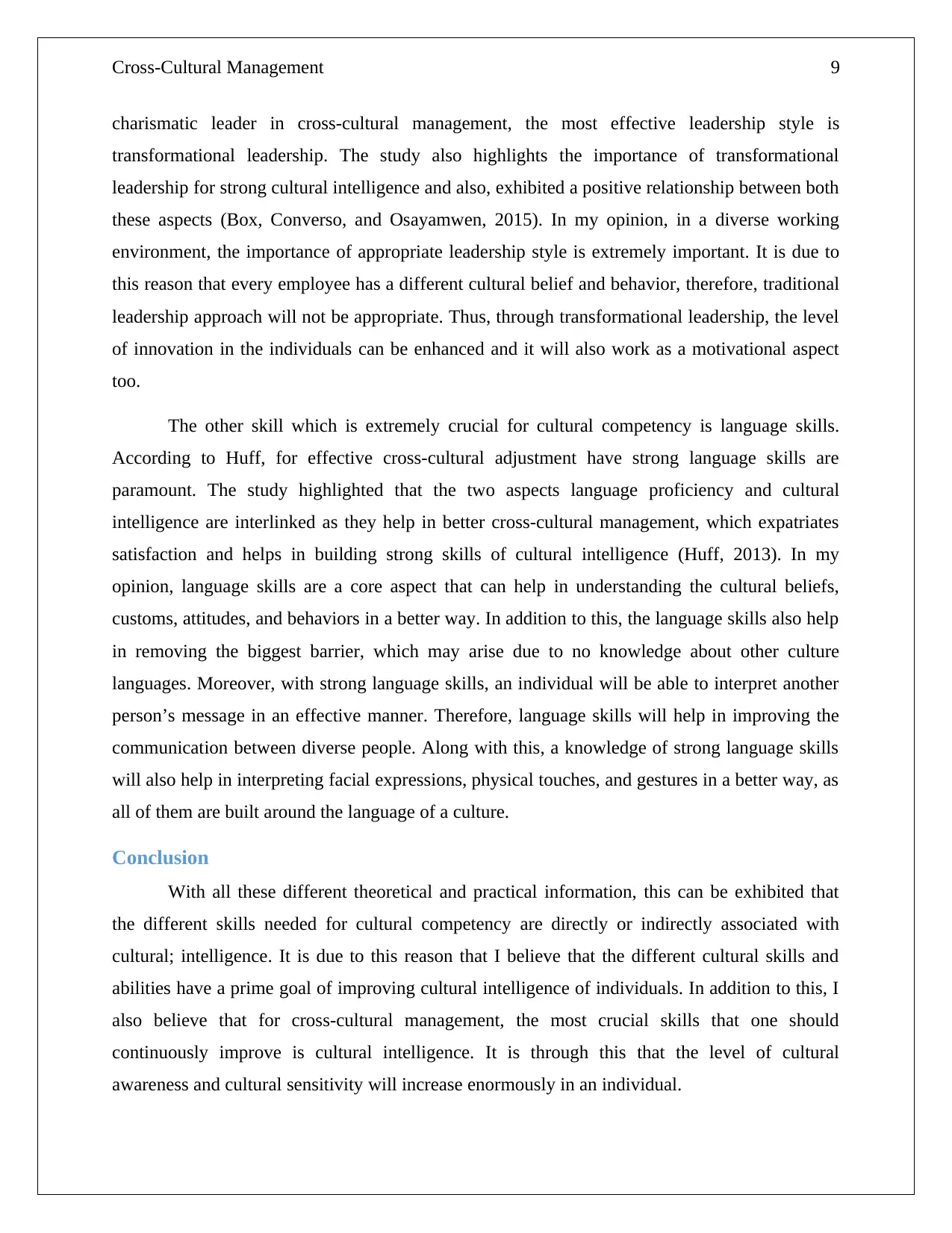
Cross-Cultural Management 9
charismatic leader in cross-cultural management, the most effective leadership style is
transformational leadership. The study also highlights the importance of transformational
leadership for strong cultural intelligence and also, exhibited a positive relationship between both
these aspects (Box, Converso, and Osayamwen, 2015). In my opinion, in a diverse working
environment, the importance of appropriate leadership style is extremely important. It is due to
this reason that every employee has a different cultural belief and behavior, therefore, traditional
leadership approach will not be appropriate. Thus, through transformational leadership, the level
of innovation in the individuals can be enhanced and it will also work as a motivational aspect
too.
The other skill which is extremely crucial for cultural competency is language skills.
According to Huff, for effective cross-cultural adjustment have strong language skills are
paramount. The study highlighted that the two aspects language proficiency and cultural
intelligence are interlinked as they help in better cross-cultural management, which expatriates
satisfaction and helps in building strong skills of cultural intelligence (Huff, 2013). In my
opinion, language skills are a core aspect that can help in understanding the cultural beliefs,
customs, attitudes, and behaviors in a better way. In addition to this, the language skills also help
in removing the biggest barrier, which may arise due to no knowledge about other culture
languages. Moreover, with strong language skills, an individual will be able to interpret another
person’s message in an effective manner. Therefore, language skills will help in improving the
communication between diverse people. Along with this, a knowledge of strong language skills
will also help in interpreting facial expressions, physical touches, and gestures in a better way, as
all of them are built around the language of a culture.
Conclusion
With all these different theoretical and practical information, this can be exhibited that
the different skills needed for cultural competency are directly or indirectly associated with
cultural; intelligence. It is due to this reason that I believe that the different cultural skills and
abilities have a prime goal of improving cultural intelligence of individuals. In addition to this, I
also believe that for cross-cultural management, the most crucial skills that one should
continuously improve is cultural intelligence. It is through this that the level of cultural
awareness and cultural sensitivity will increase enormously in an individual.
charismatic leader in cross-cultural management, the most effective leadership style is
transformational leadership. The study also highlights the importance of transformational
leadership for strong cultural intelligence and also, exhibited a positive relationship between both
these aspects (Box, Converso, and Osayamwen, 2015). In my opinion, in a diverse working
environment, the importance of appropriate leadership style is extremely important. It is due to
this reason that every employee has a different cultural belief and behavior, therefore, traditional
leadership approach will not be appropriate. Thus, through transformational leadership, the level
of innovation in the individuals can be enhanced and it will also work as a motivational aspect
too.
The other skill which is extremely crucial for cultural competency is language skills.
According to Huff, for effective cross-cultural adjustment have strong language skills are
paramount. The study highlighted that the two aspects language proficiency and cultural
intelligence are interlinked as they help in better cross-cultural management, which expatriates
satisfaction and helps in building strong skills of cultural intelligence (Huff, 2013). In my
opinion, language skills are a core aspect that can help in understanding the cultural beliefs,
customs, attitudes, and behaviors in a better way. In addition to this, the language skills also help
in removing the biggest barrier, which may arise due to no knowledge about other culture
languages. Moreover, with strong language skills, an individual will be able to interpret another
person’s message in an effective manner. Therefore, language skills will help in improving the
communication between diverse people. Along with this, a knowledge of strong language skills
will also help in interpreting facial expressions, physical touches, and gestures in a better way, as
all of them are built around the language of a culture.
Conclusion
With all these different theoretical and practical information, this can be exhibited that
the different skills needed for cultural competency are directly or indirectly associated with
cultural; intelligence. It is due to this reason that I believe that the different cultural skills and
abilities have a prime goal of improving cultural intelligence of individuals. In addition to this, I
also believe that for cross-cultural management, the most crucial skills that one should
continuously improve is cultural intelligence. It is through this that the level of cultural
awareness and cultural sensitivity will increase enormously in an individual.
Paraphrase This Document
Need a fresh take? Get an instant paraphrase of this document with our AI Paraphraser
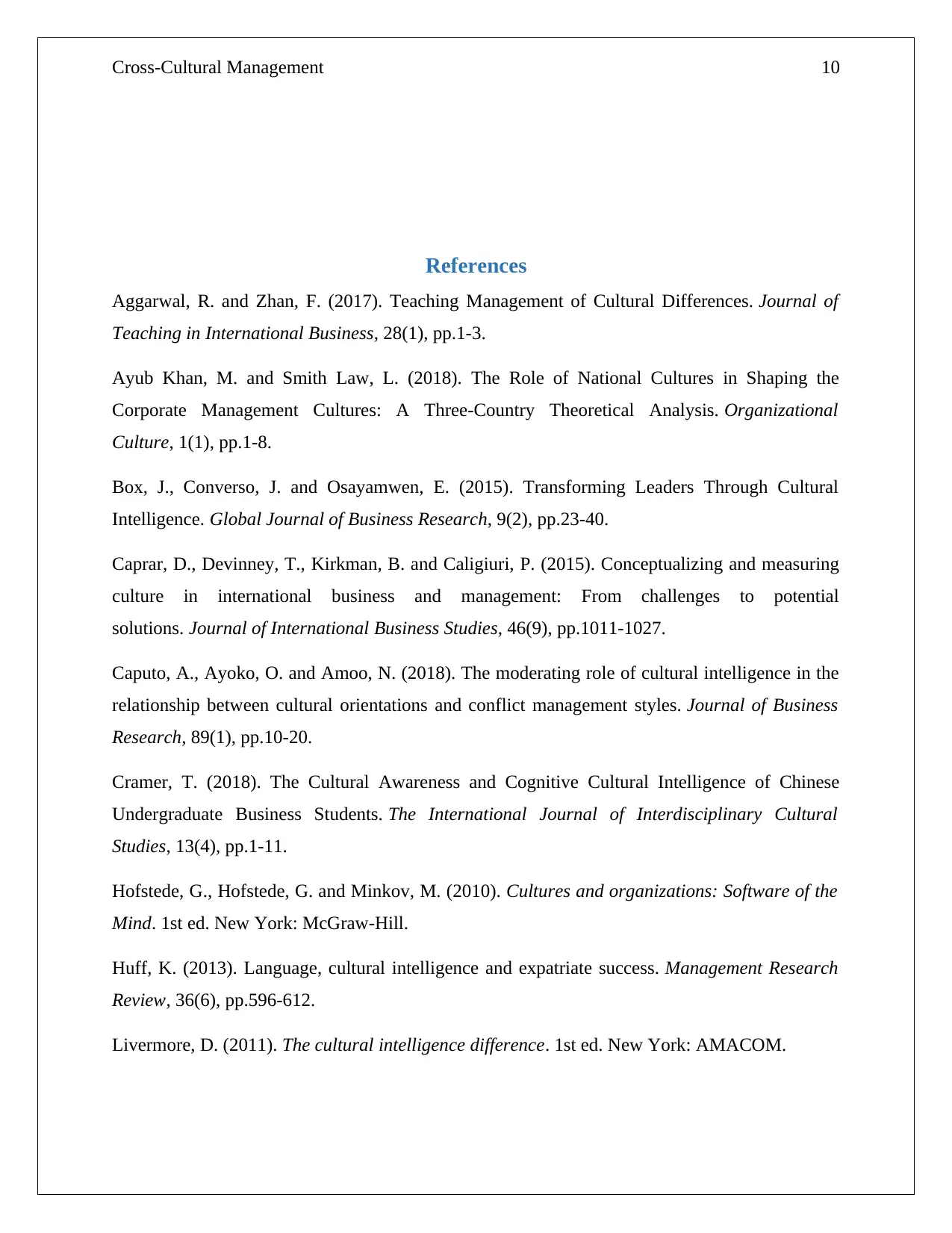
Cross-Cultural Management 10
References
Aggarwal, R. and Zhan, F. (2017). Teaching Management of Cultural Differences. Journal of
Teaching in International Business, 28(1), pp.1-3.
Ayub Khan, M. and Smith Law, L. (2018). The Role of National Cultures in Shaping the
Corporate Management Cultures: A Three-Country Theoretical Analysis. Organizational
Culture, 1(1), pp.1-8.
Box, J., Converso, J. and Osayamwen, E. (2015). Transforming Leaders Through Cultural
Intelligence. Global Journal of Business Research, 9(2), pp.23-40.
Caprar, D., Devinney, T., Kirkman, B. and Caligiuri, P. (2015). Conceptualizing and measuring
culture in international business and management: From challenges to potential
solutions. Journal of International Business Studies, 46(9), pp.1011-1027.
Caputo, A., Ayoko, O. and Amoo, N. (2018). The moderating role of cultural intelligence in the
relationship between cultural orientations and conflict management styles. Journal of Business
Research, 89(1), pp.10-20.
Cramer, T. (2018). The Cultural Awareness and Cognitive Cultural Intelligence of Chinese
Undergraduate Business Students. The International Journal of Interdisciplinary Cultural
Studies, 13(4), pp.1-11.
Hofstede, G., Hofstede, G. and Minkov, M. (2010). Cultures and organizations: Software of the
Mind. 1st ed. New York: McGraw-Hill.
Huff, K. (2013). Language, cultural intelligence and expatriate success. Management Research
Review, 36(6), pp.596-612.
Livermore, D. (2011). The cultural intelligence difference. 1st ed. New York: AMACOM.
References
Aggarwal, R. and Zhan, F. (2017). Teaching Management of Cultural Differences. Journal of
Teaching in International Business, 28(1), pp.1-3.
Ayub Khan, M. and Smith Law, L. (2018). The Role of National Cultures in Shaping the
Corporate Management Cultures: A Three-Country Theoretical Analysis. Organizational
Culture, 1(1), pp.1-8.
Box, J., Converso, J. and Osayamwen, E. (2015). Transforming Leaders Through Cultural
Intelligence. Global Journal of Business Research, 9(2), pp.23-40.
Caprar, D., Devinney, T., Kirkman, B. and Caligiuri, P. (2015). Conceptualizing and measuring
culture in international business and management: From challenges to potential
solutions. Journal of International Business Studies, 46(9), pp.1011-1027.
Caputo, A., Ayoko, O. and Amoo, N. (2018). The moderating role of cultural intelligence in the
relationship between cultural orientations and conflict management styles. Journal of Business
Research, 89(1), pp.10-20.
Cramer, T. (2018). The Cultural Awareness and Cognitive Cultural Intelligence of Chinese
Undergraduate Business Students. The International Journal of Interdisciplinary Cultural
Studies, 13(4), pp.1-11.
Hofstede, G., Hofstede, G. and Minkov, M. (2010). Cultures and organizations: Software of the
Mind. 1st ed. New York: McGraw-Hill.
Huff, K. (2013). Language, cultural intelligence and expatriate success. Management Research
Review, 36(6), pp.596-612.
Livermore, D. (2011). The cultural intelligence difference. 1st ed. New York: AMACOM.
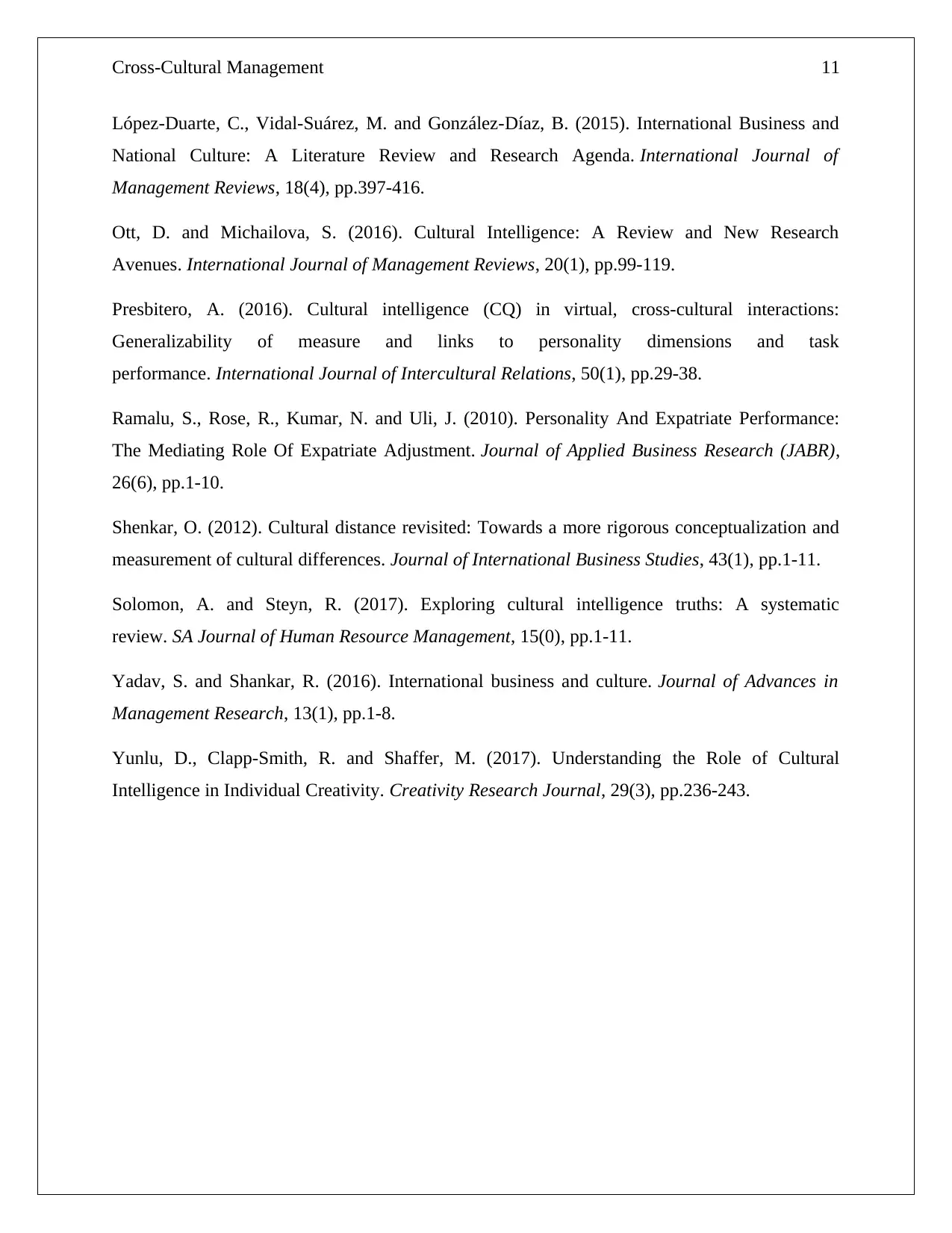
Cross-Cultural Management 11
López-Duarte, C., Vidal-Suárez, M. and González-Díaz, B. (2015). International Business and
National Culture: A Literature Review and Research Agenda. International Journal of
Management Reviews, 18(4), pp.397-416.
Ott, D. and Michailova, S. (2016). Cultural Intelligence: A Review and New Research
Avenues. International Journal of Management Reviews, 20(1), pp.99-119.
Presbitero, A. (2016). Cultural intelligence (CQ) in virtual, cross-cultural interactions:
Generalizability of measure and links to personality dimensions and task
performance. International Journal of Intercultural Relations, 50(1), pp.29-38.
Ramalu, S., Rose, R., Kumar, N. and Uli, J. (2010). Personality And Expatriate Performance:
The Mediating Role Of Expatriate Adjustment. Journal of Applied Business Research (JABR),
26(6), pp.1-10.
Shenkar, O. (2012). Cultural distance revisited: Towards a more rigorous conceptualization and
measurement of cultural differences. Journal of International Business Studies, 43(1), pp.1-11.
Solomon, A. and Steyn, R. (2017). Exploring cultural intelligence truths: A systematic
review. SA Journal of Human Resource Management, 15(0), pp.1-11.
Yadav, S. and Shankar, R. (2016). International business and culture. Journal of Advances in
Management Research, 13(1), pp.1-8.
Yunlu, D., Clapp-Smith, R. and Shaffer, M. (2017). Understanding the Role of Cultural
Intelligence in Individual Creativity. Creativity Research Journal, 29(3), pp.236-243.
López-Duarte, C., Vidal-Suárez, M. and González-Díaz, B. (2015). International Business and
National Culture: A Literature Review and Research Agenda. International Journal of
Management Reviews, 18(4), pp.397-416.
Ott, D. and Michailova, S. (2016). Cultural Intelligence: A Review and New Research
Avenues. International Journal of Management Reviews, 20(1), pp.99-119.
Presbitero, A. (2016). Cultural intelligence (CQ) in virtual, cross-cultural interactions:
Generalizability of measure and links to personality dimensions and task
performance. International Journal of Intercultural Relations, 50(1), pp.29-38.
Ramalu, S., Rose, R., Kumar, N. and Uli, J. (2010). Personality And Expatriate Performance:
The Mediating Role Of Expatriate Adjustment. Journal of Applied Business Research (JABR),
26(6), pp.1-10.
Shenkar, O. (2012). Cultural distance revisited: Towards a more rigorous conceptualization and
measurement of cultural differences. Journal of International Business Studies, 43(1), pp.1-11.
Solomon, A. and Steyn, R. (2017). Exploring cultural intelligence truths: A systematic
review. SA Journal of Human Resource Management, 15(0), pp.1-11.
Yadav, S. and Shankar, R. (2016). International business and culture. Journal of Advances in
Management Research, 13(1), pp.1-8.
Yunlu, D., Clapp-Smith, R. and Shaffer, M. (2017). Understanding the Role of Cultural
Intelligence in Individual Creativity. Creativity Research Journal, 29(3), pp.236-243.
⊘ This is a preview!⊘
Do you want full access?
Subscribe today to unlock all pages.

Trusted by 1+ million students worldwide
1 out of 13
Related Documents
Your All-in-One AI-Powered Toolkit for Academic Success.
+13062052269
info@desklib.com
Available 24*7 on WhatsApp / Email
![[object Object]](/_next/static/media/star-bottom.7253800d.svg)
Unlock your academic potential
Copyright © 2020–2026 A2Z Services. All Rights Reserved. Developed and managed by ZUCOL.




